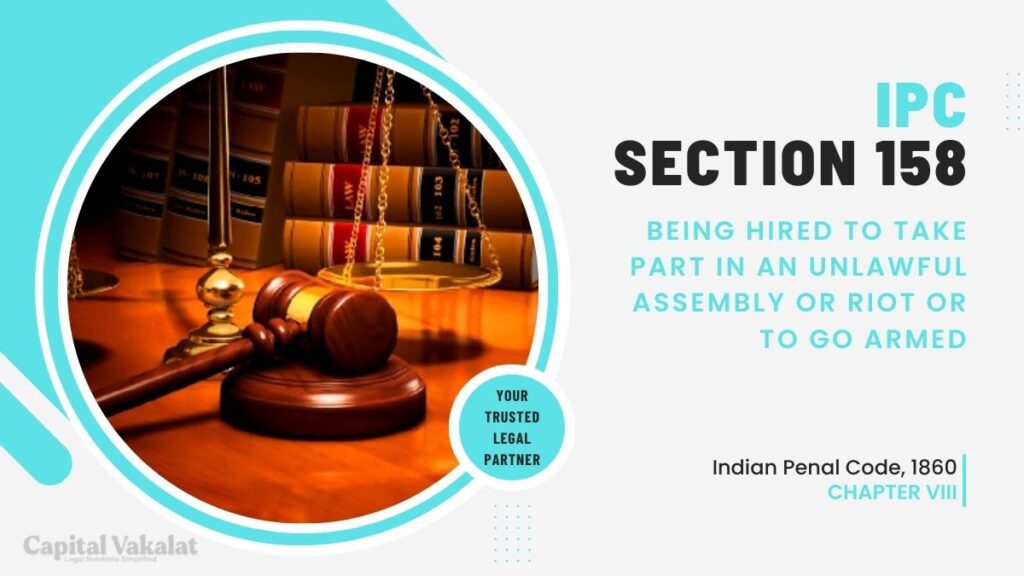In this article, we will explore Section 158 of the Indian Penal Code (IPC), which deals with being hired to take part in an unlawful assembly, riot, or going armed. This section is crucial in maintaining law and order in the country and has far-reaching implications for both individuals and society as a whole.

The Definition of Unlawful Assembly
Section 141 of the IPC defines an unlawful assembly as an assembly of five or more persons with the common object of committing an unlawful act. This act may include using criminal force, disturbing public peace, or engaging in any other activity that threatens public tranquility.
Understanding Rioting
Rioting, as defined in Section 146 of the IPC, occurs when an unlawful assembly engages in violence. It involves the use of deadly weapons, causing harm to people, or damaging property. Rioting is a grave offense, and Section 158 IPC addresses situations where individuals are hired to participate in such activities.
The Offense of Going Armed
Section 144 of the IPC pertains to individuals going armed with any deadly weapon or other items, intending to use them for unlawful purposes. This act is a significant threat to public safety and is a punishable offense.
Legal Implications of Section 158 IPC
Section 158 IPC makes it clear that being hired to take part in an unlawful assembly, riot, or going armed is a punishable offense. It aims to discourage individuals from participating in activities that disrupt public order.
Punishments and Penalties
The penalties for violating Section 158 IPC can be severe. Those found guilty may face imprisonment and fines, depending on the seriousness of the offense. The law takes a strong stance against those who willingly engage in unlawful activities.
The Historical Perspective
To understand the significance of Section 158 IPC, we need to delve into its historical context. The IPC was enacted in 1860 during British colonial rule and has since been amended to reflect contemporary societal norms.
Key Provisions of the IPC
Several other sections of the IPC relate to Section 158 and are essential in maintaining public order. These include Sections 141, 144, and 146, which define unlawful assembly, going armed, and rioting, respectively.
Landmark Cases
Over the years, several landmark legal cases have shaped the interpretation and enforcement of Section 158 IPC. These cases have set precedents and helped clarify the legal implications of this section.
Importance of Section 158 IPC in Maintaining Law and Order
Section 158 IPC plays a crucial role in maintaining law and order in India. It dissuades individuals from engaging in activities that can lead to public unrest, violence, and harm to society.
How to Avoid Being Involved in Unlawful Activities
To prevent getting entangled in unlawful activities, it is essential to stay informed about the law and make responsible choices. Understanding the consequences of participating in unlawful assemblies, riots, or going armed can help individuals steer clear of trouble.
Safeguards and Legal Rights
Individuals accused of violating Section 158 IPC have legal rights that must be upheld. It is crucial to be aware of these rights, such as the right to a fair trial and legal representation.
Conclusion
Section 158 IPC serves as a pillar of the legal framework in India, ensuring that individuals are deterred from participating in unlawful assemblies, riots, or going armed. By upholding this section, the law protects public peace and tranquility, fostering a safer society for all.
Frequently Asked Questions
What are the penalties for violating Section 158 IPC?
Penalties can include imprisonment and fines, varying based on the seriousness of the offense and specific circumstances.
How can one avoid being involved in unlawful activities covered by Section 158 IPC?
Staying informed about the law and making responsible choices is key to avoiding involvement in such activities.
What legal rights do individuals accused of violating Section 158 IPC have?
Accused individuals have legal rights, including the right to a fair trial and legal representation, which must be upheld.
What is the historical context of the IPC, and how has it evolved over the years?
The IPC was enacted in 1860 during British colonial rule and has been amended to reflect contemporary societal norms and needs.